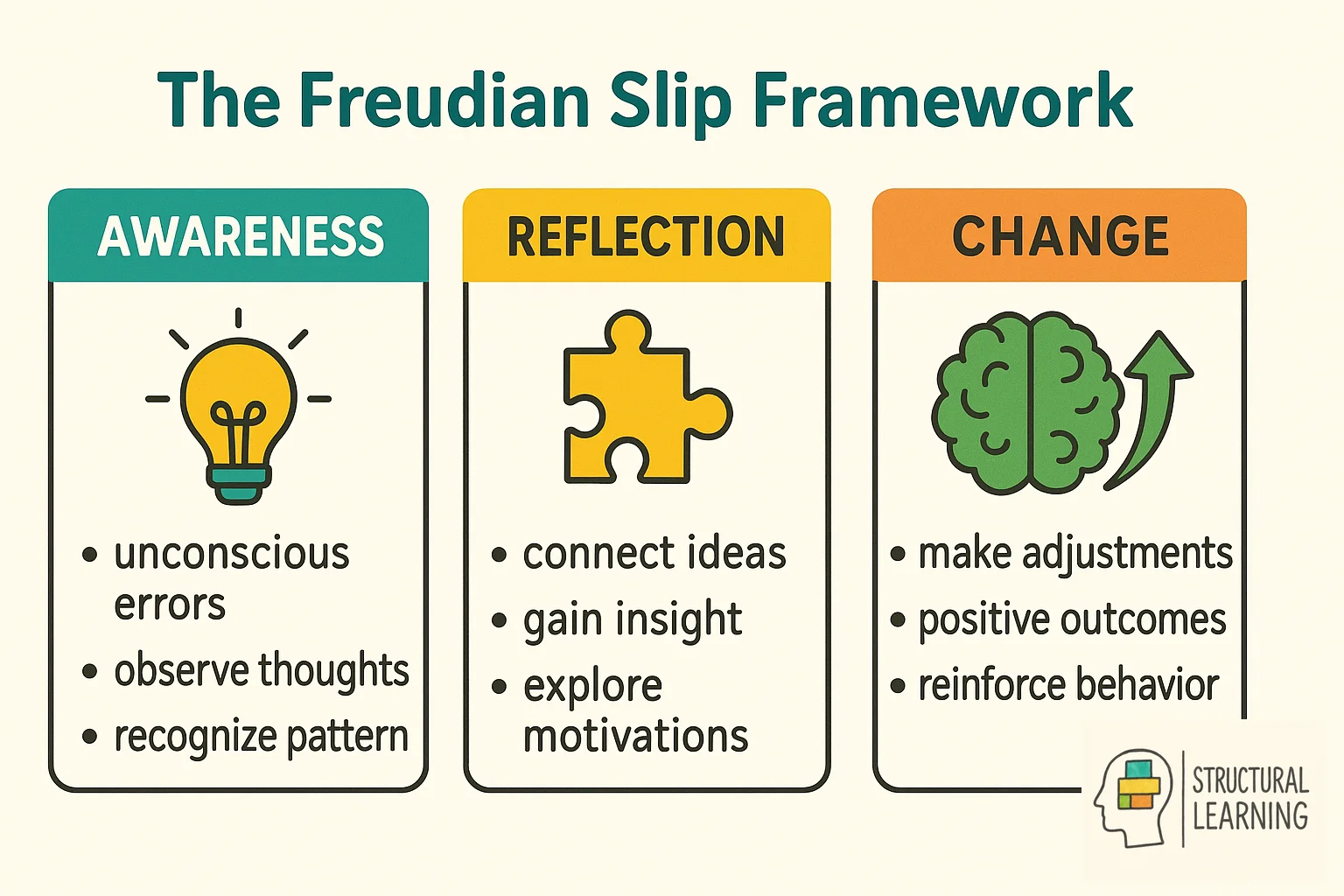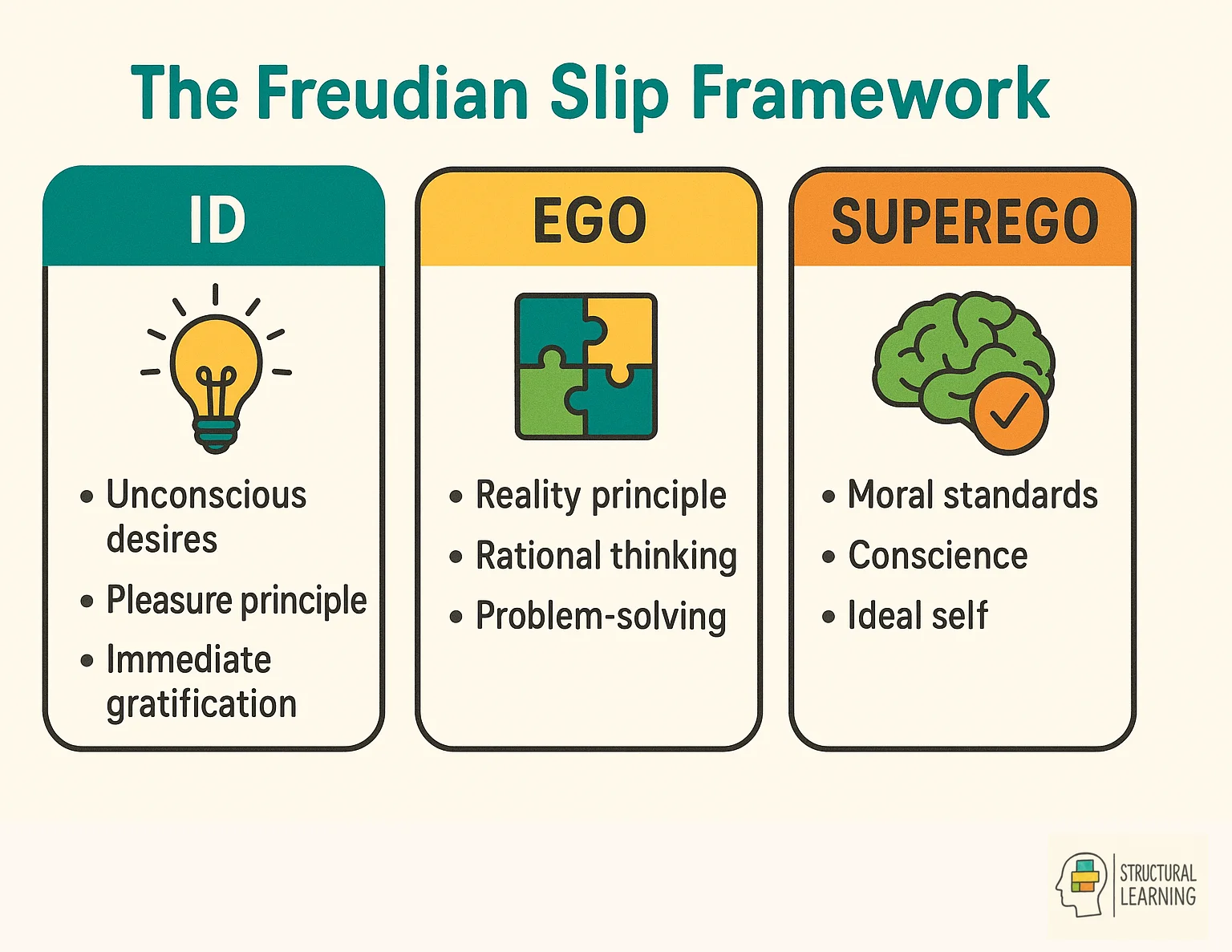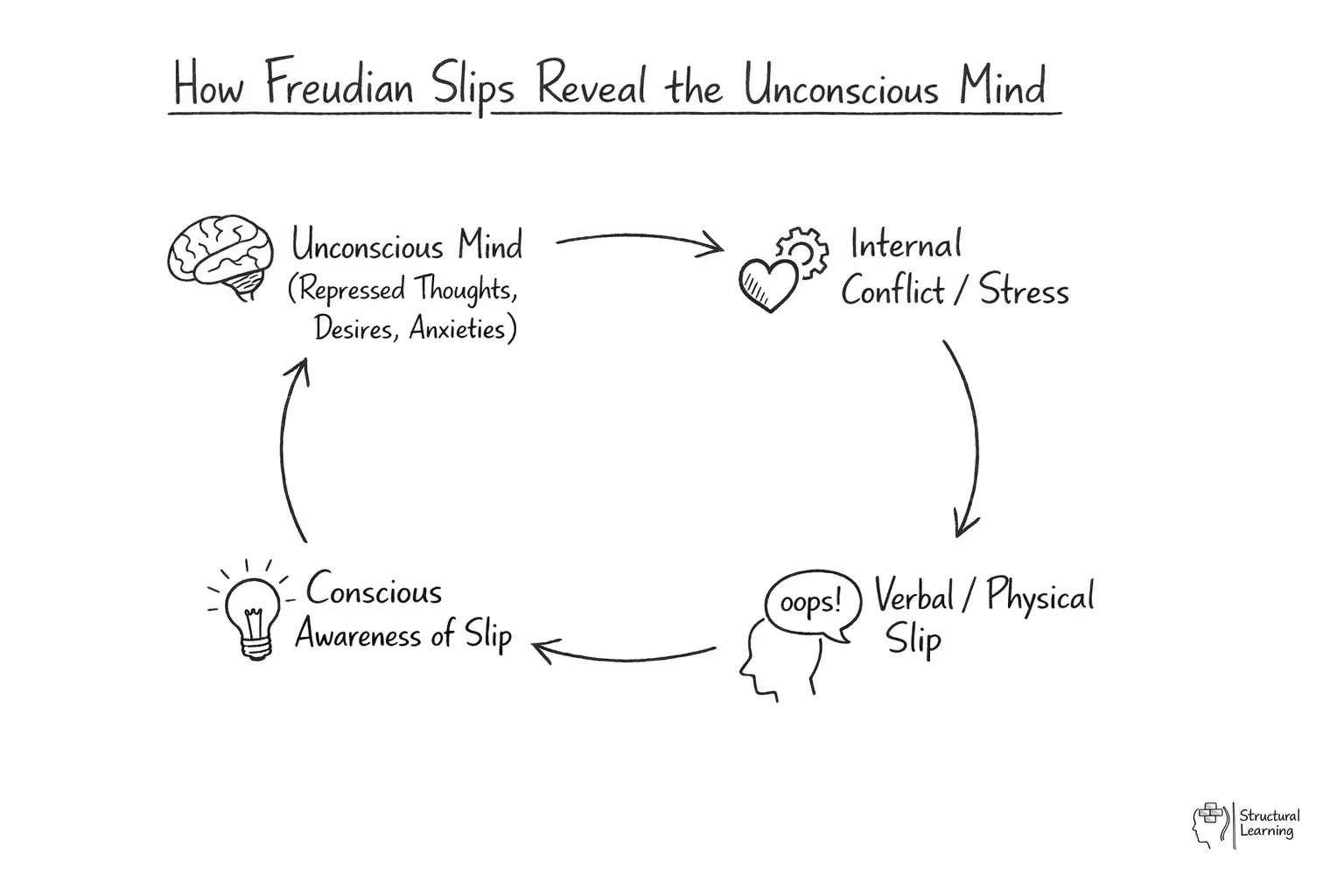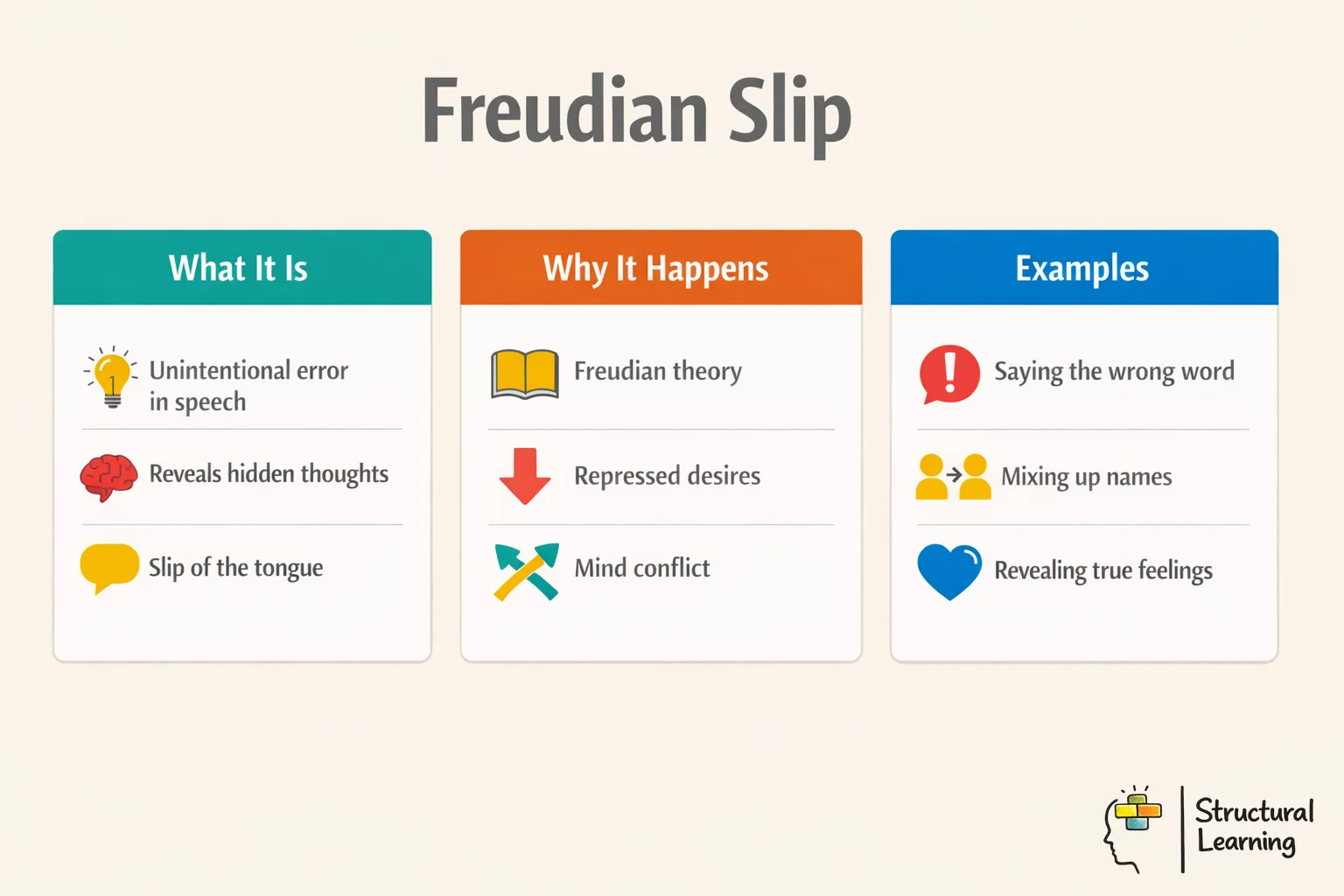Updated on
January 23, 2026
Freudian Slip
|
February 6, 2024
Explore Freudian slips with famous examples, revealing the curious interplay between language and the subconscious mind.


Updated on
January 23, 2026
|
February 6, 2024
Explore Freudian slips with famous examples, revealing the curious interplay between language and the subconscious mind.
Sigmund Freud, a pioneer in the field of psychology, introduced the concept of the Freudian Slip. This phenomenon occurs when an individual unintentionally reveals their true thoughts or feelings through a verbal or physical mistake.
Freud believed that these slips of the tongue or actions were a manifestation of the unconscious mind, providing insight into a person's inner desires and anxieties.

A Freudian Slip, also known as parapraxis, refers to an unintentional mistake in speech or behavior that reveals an individual's subconscious thoughts or desires. This concept is based on Freud's theory of the unconscious mind and the idea that these errors are not merely accidental, but rather a manifestation of hidden feelings or thoughts.
Freud argued that these slips often occur when an individual is experiencing internal conflict or anxiety, and can provide valuable insight into the person's psychological state. Freudian slips are often seen as humorous or embarrassing, but Freud believed they could provide a deeper understanding of an individual's psychological processes.
Sigmund Freud, born in 1856, was an Austrian neurologist who is widely considered the founding father of psychoanalysis, a method for treating mental illness and a theory that explains human behavior. Freud's work in the late 19th and early 20th centuries revolutionized the understanding of the mind, introducing concepts such as the subconscious, repression, and the Oedipus complex.

Freud's theories have had a lasting impact on modern psychology. His ideas about the subconscious and the influence of early childhood experiences on adult behavior have contributed to our understanding of mental illness and therapy. The concept of a Freudian slip, where an unintentional error in speech can reveal underlying thoughts or desires, has also entered popular culture.
Critics have challenged Freud's theories, citing a lack of scientific evidence and overly subjective interpretations of behavior. Despite this, Freud's influence on psychology is undeniable, and his ideas continue to shape our understanding of the human mind.

The unconscious mind is a reservoir of feelings, thoughts, urges, and memories outside of conscious awareness that influences behavior and emotions. Freud believed it contains repressed content like painful memories, socially unacceptable desires, and traumatic experiences. These hidden elements can surface through dreams, slips of the tongue, and other unintentional behaviors.
The concept of the unconscious mind has been a fascinating topic in psychology for many years. Understanding the unconscious mind is crucial to understanding human behavior and shaping our thoughts, feelings, and actions. In this brief overview, we will explore the key aspects of the unconscious mind and its implications for everyday life.
The unconscious mind, as proposed by Sigmund Freud, is a reservoir of thoughts, feelings, and memories that are not readily accessible to conscious awareness. This part of the mind is believed to influence our behavior and emotions, and yet we are often unaware of its impact.
Recent research in psychology has expanded our understanding of the unconscious mind, showing how it shapes our perceptions, decisions, and even our interpersonal relationships. By gaining insight into the workings of the unconscious mind, we can better understand ourselves and others, and ultimately make positive changes in our lives.
Freud proposed that the unconscious mind has a powerful influence on behavior, often manifesting itself through verbal stumblings known as Freudian slips. These slips may reveal hidden meanings and unconscious desires that the individual is not consciously aware of.
For example, calling someone by the wrong name could be a slip that uncovers a suppressed desire or feeling towards that person.
Research on Freudian slips supports the idea that unconscious desires influence behavior. In one study, participants were asked to complete a word association task while receiving electric shocks. The results showed that when participants were presented with sexually charged words, they were more likely to make verbal stumblings.
This demonstrates how unconscious desires can affect behavior, even in a controlled experimental setting.
The suppression of urges can also lead to the unintentional revelation of those desires through Freudian slips. This further highlights the powerful influence of the unconscious mind on behavior and verbal expressions.
Ultimately, Freud's concept of the unconscious mind sheds light on how hidden desires can shape behavior and reveal themselves through subtle slip-ups.

Verbal slips are unintentional mistakes in speech where a person says something different from what they intended, often revealing suppressed thoughts or feelings. These errors typically occur during moments of distraction, stress, or when discussing emotionally charged topics. Common examples include calling someone by the wrong name or accidentally saying the opposite of what you meant.

Verbal slips and errors refer to the unintentional mistakes we make when speaking, such as Freudian slips, spoonerisms, or slips of the tongue. These slip-ups can provide fascinating insights into the workings of the human mind and can reveal underlying thoughts, emotions, and attitudes that we may not be consciously aware of.
1. Freudian Slips:
Freudian slips, also known as parapraxes, are errors in speech that reveal hidden thoughts, desires, or beliefs. These slips are often associated with Sigmund Freud, the founder of psychoanalysis, who believed that they were a window into the unconscious mind. For example, saying "I love you" instead of "I like you" to a friend may reveal deeper feelings that were not consciously acknowledged.

2. Spoonerisms:
Named after Reverend William Archibald Spooner, who was notorious for making these errors, spoonerisms occur when the initial sounds or letters of two words are switched. For example, saying "tease my ears" instead of "ease my tears." These slips can be amusing, but they also provide insight into the cognitive processes involved in speech production.
3. Slips of the Tongue:
Slips of the tongue are unintentional errors in speech that can result in the incorrect pronunciation, substitution, or combination of words. These errors can be caused by a variety of factors, including fatigue, stress, distraction, or simply misspeaking. Studying slips of the tongue can provide valuable information about language processing and the mechanisms involved in speech production.

Verbal slips, errors, and mistakes are common occurrences in everyday speech that can be triggered by mental errors, repression, or avoidance. These can range from simple mispronunciations or stumbling over words to more complex Freudian slips, which often reveal unconscious thoughts or feelings.
Freudian slips are named after Sigmund Freud, who believed that these verbal mistakes were caused by repressed thoughts or desires slipping out unintentionally. Common examples include saying the wrong name, misquoting or misinterpreting a word, or using the wrong word entirely.
Verbal blunders, on the other hand, are less intentional and can occur simply as a result of mental slip-ups or distractions. These can range from forgetting a word or phrase, to mixing up idiomatic expressions or saying something unintentionally humorous.
Overall, verbal slips, errors, and mistakes are a natural part of human communication. While they can be embarrassing at times, they often provide insight into the workings of the human mind and can lead to amusing or enlightening moments in our conversations.

Conscious verbal errors are those that we make deliberately, usually for some underlying motive. For example, a person might tell a white lie to spare someone's feelings, or intentionally use sarcasm to convey a certain message. On the other hand, unconscious verbal errors are made without the individual's awareness, and are typically a result of cognitive or linguistic processes. An example of this could be a slip of the tongue, such as saying "butter and jame" instead of "butter and jam."
Recognizing and interpreting these errors involves considering the context in which they occur and the potential underlying motivations. When someone is consciously making a verbal error, there may be specific cues such as a deliberate pause before speaking or the use of certain language that suggests a hidden agenda.
Unconscious verbal errors, on the other hand, may appear more spontaneous and reflect the individual's true thoughts or feelings.
In conclusion, being able to distinguish between conscious and unconscious verbal errors requires careful consideration of the context, language used, and potential motivations behind the mistakes. These indicators can provide valuable insights into the individual's mindset and intentions.

Verbal slip-ups, also known as Freudian slips, are often seen as the unintentional reveal of our hidden desires and thoughts that lie within the unconscious mind.
Sigmund Freud, the father of psychoanalysis, believed that these slip-ups were manifestations of our repressed thoughts and desires that our conscious mind was trying to keep hidden.
Early studies on verbal slip-ups found that these mistakes often involved a substitution of words that were related to the hidden desires or thoughts of the individual. For example, someone might accidentally say "I love you" instead of "I like you" to someone they are secretly attracted to.
These findings suggest that the unconscious mind plays a significant role in verbal slip-ups, as it is responsible for storing and processing our deepest desires and thoughts. Subconscious processes, such as wish fulfillment and defense mechanisms, can influence these slip-ups and cause them to occur without our conscious awareness.
The unconscious mind has a profound impact on verbal slip-ups, as it is the source of our hidden desires and thoughts that can inadvertently reveal themselves through Freudian slips.

Modern psychologists argue that verbal slips are often simple cognitive errors caused by fatigue, distraction, or language processing mistakes rather than hidden desires. Research in cognitive psychology suggests these errors occur due to competing neural pathways and automatic speech patterns. Many slips can be explained by phonetic similarities between words or contextual priming without invoking unconscious motives.
Freudian slips, often described as verbal errors revealing unexpressed desires, have fascinated psychologists and linguists alike. These phenomena provide insight into how the brain processes language and organizes information in cognitive systems. Below is a table summarizing key research on Freudian slips, examining alternative explanations, plausible mechanisms, and their implications for understanding speech errors and faulty actions.
| Key Study | Key Outcomes | Strength of Evidence | Additional Notes |
|---|---|---|---|
| Motley & Baars (1976) | Semantic biases significantly increase the likelihood of verbal slips, supporting Freudian theories of intent. | Strong: Controlled experiments with high error induction rates. | Demonstrates links between speech errors and unexpressed cognitive processes. |
| Bröder & Bredenkamp (1996) | Modified SLIP technique showed higher error probabilities when unconscious priming was used. | Moderate: Multinomial modeling of unconscious vs. conscious processes. | Suggests organizational pockets in the brain influencing speech errors. |
| Hinterhuber (2007) | Historical analysis highlights the psycholinguistic dimensions of Freudian slips and alternative linguistic explanations. | Moderate: Comparative study of psycholinguistic theories. | Aligns Freudian slips with broader communication errors and faulty actions. |
| Ruch (1972) | Differentiates Freudian slips from general speech errors, emphasizing their link to unconscious desires. | Strong: Conceptual framework integrating information theory. | Provides a straightforward explanation for intentional vs. random errors. |
| Thieffry et al. (2023) | Defensive mechanisms influence the likelihood of taboo slips, supporting Freudian views of repression. | Strong: Experimental study with psychodynamic modeling. | Examines defensive processes in generating speech errors. |
This table highlights how Freudian slips reveal underlying cognitive and emotional processes, offering plausible explanations for communication errors and their connection to unconscious mental activities. These studies deepen our understanding of how the brain processes language and reveal the intricate interplay between intent and error in speech production.
Daniel Wegner's ironic process theory suggests that trying to suppress certain thoughts actually makes them more likely to surface, especially under cognitive load or stress. His research showed that when people actively try not to think about something, their monitoring process paradoxically keeps that very thought activated. This explains why forbidden or inappropriate thoughts often emerge as verbal slips when we're trying hardest to avoid them.
Daniel Wegner's theory on verbal errors explores the phenomenon known as "verbal slips", those moments when we accidentally say something we didn't intend to. Wegner suggests that these slips are not simply random mistakes, but rather, they reveal our underlying thoughts and intentions.
According to Wegner, when we try to suppress a thought or intention, it can actually become more likely to surface in our speech, leading to these verbal errors. This theory challenges the traditional view of verbal slips as simple accidents, and instead posits that they can provide insight into the workings of our unconscious mind.
Daniel Wegner's theory on thought suppression revolves around the concept of the "theory of ironic process." According to Wegner, when individuals try to repress specific thoughts, the brain periodically "checks in" to ensure that the thoughts are still being suppressed.
This continuous monitoring can ironically bring the concealed thoughts to the forefront of the mind, making it more likely that individuals will end up verbalizing them.
For example, if someone tries to suppress thoughts about a particular topic, the brain's constant checking in to ensure suppression can actually result in the thoughts becoming more accessible and more likely to be verbalized.
This phenomenon can lead to what Wegner refers to as "verbal slips," where individuals unintentionally express the very thoughts they were trying to suppress.
Ultimately, Wegner's theory highlights the difficulty of thought suppression and the ironic process that occurs when individuals attempt to repress their thoughts. This insight can be valuable in understanding how the mind works and the challenges of controlling our thoughts and verbal expressions.
Thought suppression, the attempt to consciously avoid certain thoughts or feelings, can ironically lead to the very verbal errors that individuals seek to avoid. According to the "theory of ironic process" proposed by Wegner (1994), attempts to suppress certain thoughts can lead to an ironic rebound effect, causing those thoughts to come to mind more frequently. This can result in individuals making verbal slip-ups, as demonstrated by numerous studies.
For example, Wegner et al. (1987) found that participants who were instructed to avoid thinking about a white bear ended up mentioning the bear more often than those who were not given such instructions. Additionally, a study by Macrae et al. (1997) found that individuals who were asked to suppress thoughts about a specific person ended up mentioning that person more frequently in a subsequent conversation.
This phenomenon is further illustrated by Freudian slips, in which seemingly innocent verbal errors can reveal unconscious thoughts or feelings. For instance, someone accidentally calling their partner by an ex's name may be the result of attempting to suppress thoughts about the past relationship. In conclusion, thought suppression can lead to verbal errors due to the ironic process, resulting in speech blunders and Freudian slips.

Common Freudian slips include calling a current partner by an ex's name, saying 'I hate you' instead of 'I love you,' or accidentally revealing secrets when trying to keep them hidden. Teachers often experience slips like calling students by their siblings' names or revealing their true feelings about difficult students. These mistakes typically happen during emotional conversations or when someone is preoccupied with conflicting thoughts.
While sometimes considered mere human error, Freudian theory posits that these slips arise from the disturbing influence of the unconscious mind. Here’s a list of nine notable Freudian slip examples that occurred in the public eye, illustrating how even the most controlled environments can't always keep the unconscious in check:
These instances from famous figures suggest that our speech may indeed be influenced by deeper thought processes. While alternative and physiological explanations exist, such as fatigue or distraction, the concept of the Freudian slip continues to fascinate, offering a window into the complex relationship between the conscious mind and the incorrect action or memory mistake.

Freud's 'The Psychopathology of Everyday Life' (1901) remains the foundational text explaining his theory of verbal slips and their unconscious origins. Modern perspectives can be found in 'White Bears and Other Unwanted Thoughts' by Daniel Wegner and 'Strangers to Ourselves' by Timothy Wilson. These works provide both classical psychoanalytic views and contemporary cognitive explanations of verbal errors.
Here are five studies that explore the concept of Freudian slips, each accompanied by a brief summary and a link to the original paper:
These studies provide insights into the efficacy and interpretation of Freudian slips, showing their continued relevance in psychoanalytic theory and beyond.
A Freudian slip, also known as parapraxis, is an unintentional mistake in speech or behaviour that reveals subconscious thoughts or desires, rather than being merely accidental. Unlike simple errors caused by tiredness or distraction, Freudian slips occur when individuals experience internal conflict or anxiety and provide insight into their psychological state. These slips often happen during emotionally charged moments or when discussing sensitive topics.
Teachers can recognise verbal slips in pupil conversations as potential indicators of underlying anxiety, conflict, or unspoken needs before they manifest as behavioural issues. By paying attention to these unconscious revelations, educators can identify students who may need additional emotional support or intervention. This awareness helps teachers address problems proactively rather than reactively.
According to Freudian theory, this type of slip may reveal unconscious thoughts about your teaching relationships and how you perceive similarities between the siblings. The error could indicate suppressed feelings or comparisons you're making between the students that influence your classroom dynamics. Understanding this can help you reflect on potential unconscious bias in your teaching approach.
Recognising Freudian slips in professional settings helps educators decode what colleagues and parents are really communicating beyond their intended words. These verbal errors can reveal underlying concerns, anxieties, or conflicts that aren't being directly expressed. This awareness enables more effective communication and helps address unspoken issues that might otherwise create misunderstandings.
Freudian slips typically occur during moments of stress, distraction, or when discussing emotionally charged topics, making them common during difficult conversations with parents, challenging classroom situations, or high-pressure meetings. They're also more likely when individuals are experiencing internal conflict about a situation or suppressing their true feelings. Understanding these triggers helps educators be more mindful of their communication in sensitive situations.
Critics argue that Freudian theory lacks scientific evidence and relies on overly subjective interpretations of behaviour, meaning not every verbal slip necessarily reveals deep unconscious meaning. Sometimes mistakes are simply the result of fatigue, distraction, or normal cognitive processing errors rather than hidden psychological conflicts. Educators should use this understanding as one tool among many, rather than making definitive judgements based solely on verbal slips.
These peer-reviewed studies provide deeper insights into freudian slip and its application in educational settings.
Predicting the bond stress–slip behavior of steel reinforcement in concrete under static and dynamic loadings by finite element, deep learning and analytical methods View study ↗70 citations
Long et al. (2024)
This paper examines the mechanical behavior of steel reinforcement slipping within concrete structures under various loading conditions using computational and analytical methods. While this engineering study focuses on structural slip rather than psychological slips, it is not relevant to teachers studying Freudian slips as it deals with construction materials rather than unconscious verbal errors.
Elevated Temperature Effects on FRP–Concrete Bond Behavior: A Comprehensive Review and Machine Learning-Based Bond Strength Prediction View study ↗15 citations
Salameh et al. (2024)
This research investigates how high temperatures affect the bonding between fiber-reinforced polymer materials and concrete, using machine learning to predict bond strength failures. This engineering study on material slip and failure is not relevant to teachers learning about Freudian slips, as it focuses on construction technology rather than psychological phenomena.
Teaching–learning-based optimisation algorithm and its application in capturing critical slip surface in slope stability analysis View study ↗27 citations
Mishra et al. (2019)
This study applies a teaching-learning optimization algorithm to identify critical slip surfaces in slope stability analysis for geotechnical engineering applications. Despite mentioning teaching-learning concepts, this paper focuses on geological slip surfaces and is not relevant to educators studying Freudian slips or psychological slip phenomena.
Use of Slip Board Media in Increasing Vocabulary Ability View study ↗
Yuva et al. (2023)
This classroom action research study examines how slip board media can be used as an educational tool to improve vocabulary learning among first-grade elementary students. This paper is relevant to teachers interested in Freudian slips because it demonstrates practical classroom applications of slip-based learning tools, though it focuses on intentional educational slips rather than unconscious verbal errors.
Efforts to Increase the Interest and Learning Outcomes Students in Learning Indonesian Through Slipboard Media View study ↗2 citations
Oktadita et al. (2023)
This classroom action research investigates the effectiveness of slip board media in increasing student interest and learning outcomes in Indonesian language instruction for fourth-grade students. This study is relevant to teachers learning about Freudian slips as it provides concrete examples of how slip-based educational tools can be implemented in language learning contexts, offering practical classroom applications.
Sigmund Freud, a pioneer in the field of psychology, introduced the concept of the Freudian Slip. This phenomenon occurs when an individual unintentionally reveals their true thoughts or feelings through a verbal or physical mistake.
Freud believed that these slips of the tongue or actions were a manifestation of the unconscious mind, providing insight into a person's inner desires and anxieties.

A Freudian Slip, also known as parapraxis, refers to an unintentional mistake in speech or behavior that reveals an individual's subconscious thoughts or desires. This concept is based on Freud's theory of the unconscious mind and the idea that these errors are not merely accidental, but rather a manifestation of hidden feelings or thoughts.
Freud argued that these slips often occur when an individual is experiencing internal conflict or anxiety, and can provide valuable insight into the person's psychological state. Freudian slips are often seen as humorous or embarrassing, but Freud believed they could provide a deeper understanding of an individual's psychological processes.
Sigmund Freud, born in 1856, was an Austrian neurologist who is widely considered the founding father of psychoanalysis, a method for treating mental illness and a theory that explains human behavior. Freud's work in the late 19th and early 20th centuries revolutionized the understanding of the mind, introducing concepts such as the subconscious, repression, and the Oedipus complex.

Freud's theories have had a lasting impact on modern psychology. His ideas about the subconscious and the influence of early childhood experiences on adult behavior have contributed to our understanding of mental illness and therapy. The concept of a Freudian slip, where an unintentional error in speech can reveal underlying thoughts or desires, has also entered popular culture.
Critics have challenged Freud's theories, citing a lack of scientific evidence and overly subjective interpretations of behavior. Despite this, Freud's influence on psychology is undeniable, and his ideas continue to shape our understanding of the human mind.

The unconscious mind is a reservoir of feelings, thoughts, urges, and memories outside of conscious awareness that influences behavior and emotions. Freud believed it contains repressed content like painful memories, socially unacceptable desires, and traumatic experiences. These hidden elements can surface through dreams, slips of the tongue, and other unintentional behaviors.
The concept of the unconscious mind has been a fascinating topic in psychology for many years. Understanding the unconscious mind is crucial to understanding human behavior and shaping our thoughts, feelings, and actions. In this brief overview, we will explore the key aspects of the unconscious mind and its implications for everyday life.
The unconscious mind, as proposed by Sigmund Freud, is a reservoir of thoughts, feelings, and memories that are not readily accessible to conscious awareness. This part of the mind is believed to influence our behavior and emotions, and yet we are often unaware of its impact.
Recent research in psychology has expanded our understanding of the unconscious mind, showing how it shapes our perceptions, decisions, and even our interpersonal relationships. By gaining insight into the workings of the unconscious mind, we can better understand ourselves and others, and ultimately make positive changes in our lives.
Freud proposed that the unconscious mind has a powerful influence on behavior, often manifesting itself through verbal stumblings known as Freudian slips. These slips may reveal hidden meanings and unconscious desires that the individual is not consciously aware of.
For example, calling someone by the wrong name could be a slip that uncovers a suppressed desire or feeling towards that person.
Research on Freudian slips supports the idea that unconscious desires influence behavior. In one study, participants were asked to complete a word association task while receiving electric shocks. The results showed that when participants were presented with sexually charged words, they were more likely to make verbal stumblings.
This demonstrates how unconscious desires can affect behavior, even in a controlled experimental setting.
The suppression of urges can also lead to the unintentional revelation of those desires through Freudian slips. This further highlights the powerful influence of the unconscious mind on behavior and verbal expressions.
Ultimately, Freud's concept of the unconscious mind sheds light on how hidden desires can shape behavior and reveal themselves through subtle slip-ups.

Verbal slips are unintentional mistakes in speech where a person says something different from what they intended, often revealing suppressed thoughts or feelings. These errors typically occur during moments of distraction, stress, or when discussing emotionally charged topics. Common examples include calling someone by the wrong name or accidentally saying the opposite of what you meant.

Verbal slips and errors refer to the unintentional mistakes we make when speaking, such as Freudian slips, spoonerisms, or slips of the tongue. These slip-ups can provide fascinating insights into the workings of the human mind and can reveal underlying thoughts, emotions, and attitudes that we may not be consciously aware of.
1. Freudian Slips:
Freudian slips, also known as parapraxes, are errors in speech that reveal hidden thoughts, desires, or beliefs. These slips are often associated with Sigmund Freud, the founder of psychoanalysis, who believed that they were a window into the unconscious mind. For example, saying "I love you" instead of "I like you" to a friend may reveal deeper feelings that were not consciously acknowledged.

2. Spoonerisms:
Named after Reverend William Archibald Spooner, who was notorious for making these errors, spoonerisms occur when the initial sounds or letters of two words are switched. For example, saying "tease my ears" instead of "ease my tears." These slips can be amusing, but they also provide insight into the cognitive processes involved in speech production.
3. Slips of the Tongue:
Slips of the tongue are unintentional errors in speech that can result in the incorrect pronunciation, substitution, or combination of words. These errors can be caused by a variety of factors, including fatigue, stress, distraction, or simply misspeaking. Studying slips of the tongue can provide valuable information about language processing and the mechanisms involved in speech production.

Verbal slips, errors, and mistakes are common occurrences in everyday speech that can be triggered by mental errors, repression, or avoidance. These can range from simple mispronunciations or stumbling over words to more complex Freudian slips, which often reveal unconscious thoughts or feelings.
Freudian slips are named after Sigmund Freud, who believed that these verbal mistakes were caused by repressed thoughts or desires slipping out unintentionally. Common examples include saying the wrong name, misquoting or misinterpreting a word, or using the wrong word entirely.
Verbal blunders, on the other hand, are less intentional and can occur simply as a result of mental slip-ups or distractions. These can range from forgetting a word or phrase, to mixing up idiomatic expressions or saying something unintentionally humorous.
Overall, verbal slips, errors, and mistakes are a natural part of human communication. While they can be embarrassing at times, they often provide insight into the workings of the human mind and can lead to amusing or enlightening moments in our conversations.

Conscious verbal errors are those that we make deliberately, usually for some underlying motive. For example, a person might tell a white lie to spare someone's feelings, or intentionally use sarcasm to convey a certain message. On the other hand, unconscious verbal errors are made without the individual's awareness, and are typically a result of cognitive or linguistic processes. An example of this could be a slip of the tongue, such as saying "butter and jame" instead of "butter and jam."
Recognizing and interpreting these errors involves considering the context in which they occur and the potential underlying motivations. When someone is consciously making a verbal error, there may be specific cues such as a deliberate pause before speaking or the use of certain language that suggests a hidden agenda.
Unconscious verbal errors, on the other hand, may appear more spontaneous and reflect the individual's true thoughts or feelings.
In conclusion, being able to distinguish between conscious and unconscious verbal errors requires careful consideration of the context, language used, and potential motivations behind the mistakes. These indicators can provide valuable insights into the individual's mindset and intentions.

Verbal slip-ups, also known as Freudian slips, are often seen as the unintentional reveal of our hidden desires and thoughts that lie within the unconscious mind.
Sigmund Freud, the father of psychoanalysis, believed that these slip-ups were manifestations of our repressed thoughts and desires that our conscious mind was trying to keep hidden.
Early studies on verbal slip-ups found that these mistakes often involved a substitution of words that were related to the hidden desires or thoughts of the individual. For example, someone might accidentally say "I love you" instead of "I like you" to someone they are secretly attracted to.
These findings suggest that the unconscious mind plays a significant role in verbal slip-ups, as it is responsible for storing and processing our deepest desires and thoughts. Subconscious processes, such as wish fulfillment and defense mechanisms, can influence these slip-ups and cause them to occur without our conscious awareness.
The unconscious mind has a profound impact on verbal slip-ups, as it is the source of our hidden desires and thoughts that can inadvertently reveal themselves through Freudian slips.

Modern psychologists argue that verbal slips are often simple cognitive errors caused by fatigue, distraction, or language processing mistakes rather than hidden desires. Research in cognitive psychology suggests these errors occur due to competing neural pathways and automatic speech patterns. Many slips can be explained by phonetic similarities between words or contextual priming without invoking unconscious motives.
Freudian slips, often described as verbal errors revealing unexpressed desires, have fascinated psychologists and linguists alike. These phenomena provide insight into how the brain processes language and organizes information in cognitive systems. Below is a table summarizing key research on Freudian slips, examining alternative explanations, plausible mechanisms, and their implications for understanding speech errors and faulty actions.
| Key Study | Key Outcomes | Strength of Evidence | Additional Notes |
|---|---|---|---|
| Motley & Baars (1976) | Semantic biases significantly increase the likelihood of verbal slips, supporting Freudian theories of intent. | Strong: Controlled experiments with high error induction rates. | Demonstrates links between speech errors and unexpressed cognitive processes. |
| Bröder & Bredenkamp (1996) | Modified SLIP technique showed higher error probabilities when unconscious priming was used. | Moderate: Multinomial modeling of unconscious vs. conscious processes. | Suggests organizational pockets in the brain influencing speech errors. |
| Hinterhuber (2007) | Historical analysis highlights the psycholinguistic dimensions of Freudian slips and alternative linguistic explanations. | Moderate: Comparative study of psycholinguistic theories. | Aligns Freudian slips with broader communication errors and faulty actions. |
| Ruch (1972) | Differentiates Freudian slips from general speech errors, emphasizing their link to unconscious desires. | Strong: Conceptual framework integrating information theory. | Provides a straightforward explanation for intentional vs. random errors. |
| Thieffry et al. (2023) | Defensive mechanisms influence the likelihood of taboo slips, supporting Freudian views of repression. | Strong: Experimental study with psychodynamic modeling. | Examines defensive processes in generating speech errors. |
This table highlights how Freudian slips reveal underlying cognitive and emotional processes, offering plausible explanations for communication errors and their connection to unconscious mental activities. These studies deepen our understanding of how the brain processes language and reveal the intricate interplay between intent and error in speech production.
Daniel Wegner's ironic process theory suggests that trying to suppress certain thoughts actually makes them more likely to surface, especially under cognitive load or stress. His research showed that when people actively try not to think about something, their monitoring process paradoxically keeps that very thought activated. This explains why forbidden or inappropriate thoughts often emerge as verbal slips when we're trying hardest to avoid them.
Daniel Wegner's theory on verbal errors explores the phenomenon known as "verbal slips", those moments when we accidentally say something we didn't intend to. Wegner suggests that these slips are not simply random mistakes, but rather, they reveal our underlying thoughts and intentions.
According to Wegner, when we try to suppress a thought or intention, it can actually become more likely to surface in our speech, leading to these verbal errors. This theory challenges the traditional view of verbal slips as simple accidents, and instead posits that they can provide insight into the workings of our unconscious mind.
Daniel Wegner's theory on thought suppression revolves around the concept of the "theory of ironic process." According to Wegner, when individuals try to repress specific thoughts, the brain periodically "checks in" to ensure that the thoughts are still being suppressed.
This continuous monitoring can ironically bring the concealed thoughts to the forefront of the mind, making it more likely that individuals will end up verbalizing them.
For example, if someone tries to suppress thoughts about a particular topic, the brain's constant checking in to ensure suppression can actually result in the thoughts becoming more accessible and more likely to be verbalized.
This phenomenon can lead to what Wegner refers to as "verbal slips," where individuals unintentionally express the very thoughts they were trying to suppress.
Ultimately, Wegner's theory highlights the difficulty of thought suppression and the ironic process that occurs when individuals attempt to repress their thoughts. This insight can be valuable in understanding how the mind works and the challenges of controlling our thoughts and verbal expressions.
Thought suppression, the attempt to consciously avoid certain thoughts or feelings, can ironically lead to the very verbal errors that individuals seek to avoid. According to the "theory of ironic process" proposed by Wegner (1994), attempts to suppress certain thoughts can lead to an ironic rebound effect, causing those thoughts to come to mind more frequently. This can result in individuals making verbal slip-ups, as demonstrated by numerous studies.
For example, Wegner et al. (1987) found that participants who were instructed to avoid thinking about a white bear ended up mentioning the bear more often than those who were not given such instructions. Additionally, a study by Macrae et al. (1997) found that individuals who were asked to suppress thoughts about a specific person ended up mentioning that person more frequently in a subsequent conversation.
This phenomenon is further illustrated by Freudian slips, in which seemingly innocent verbal errors can reveal unconscious thoughts or feelings. For instance, someone accidentally calling their partner by an ex's name may be the result of attempting to suppress thoughts about the past relationship. In conclusion, thought suppression can lead to verbal errors due to the ironic process, resulting in speech blunders and Freudian slips.

Common Freudian slips include calling a current partner by an ex's name, saying 'I hate you' instead of 'I love you,' or accidentally revealing secrets when trying to keep them hidden. Teachers often experience slips like calling students by their siblings' names or revealing their true feelings about difficult students. These mistakes typically happen during emotional conversations or when someone is preoccupied with conflicting thoughts.
While sometimes considered mere human error, Freudian theory posits that these slips arise from the disturbing influence of the unconscious mind. Here’s a list of nine notable Freudian slip examples that occurred in the public eye, illustrating how even the most controlled environments can't always keep the unconscious in check:
These instances from famous figures suggest that our speech may indeed be influenced by deeper thought processes. While alternative and physiological explanations exist, such as fatigue or distraction, the concept of the Freudian slip continues to fascinate, offering a window into the complex relationship between the conscious mind and the incorrect action or memory mistake.

Freud's 'The Psychopathology of Everyday Life' (1901) remains the foundational text explaining his theory of verbal slips and their unconscious origins. Modern perspectives can be found in 'White Bears and Other Unwanted Thoughts' by Daniel Wegner and 'Strangers to Ourselves' by Timothy Wilson. These works provide both classical psychoanalytic views and contemporary cognitive explanations of verbal errors.
Here are five studies that explore the concept of Freudian slips, each accompanied by a brief summary and a link to the original paper:
These studies provide insights into the efficacy and interpretation of Freudian slips, showing their continued relevance in psychoanalytic theory and beyond.
A Freudian slip, also known as parapraxis, is an unintentional mistake in speech or behaviour that reveals subconscious thoughts or desires, rather than being merely accidental. Unlike simple errors caused by tiredness or distraction, Freudian slips occur when individuals experience internal conflict or anxiety and provide insight into their psychological state. These slips often happen during emotionally charged moments or when discussing sensitive topics.
Teachers can recognise verbal slips in pupil conversations as potential indicators of underlying anxiety, conflict, or unspoken needs before they manifest as behavioural issues. By paying attention to these unconscious revelations, educators can identify students who may need additional emotional support or intervention. This awareness helps teachers address problems proactively rather than reactively.
According to Freudian theory, this type of slip may reveal unconscious thoughts about your teaching relationships and how you perceive similarities between the siblings. The error could indicate suppressed feelings or comparisons you're making between the students that influence your classroom dynamics. Understanding this can help you reflect on potential unconscious bias in your teaching approach.
Recognising Freudian slips in professional settings helps educators decode what colleagues and parents are really communicating beyond their intended words. These verbal errors can reveal underlying concerns, anxieties, or conflicts that aren't being directly expressed. This awareness enables more effective communication and helps address unspoken issues that might otherwise create misunderstandings.
Freudian slips typically occur during moments of stress, distraction, or when discussing emotionally charged topics, making them common during difficult conversations with parents, challenging classroom situations, or high-pressure meetings. They're also more likely when individuals are experiencing internal conflict about a situation or suppressing their true feelings. Understanding these triggers helps educators be more mindful of their communication in sensitive situations.
Critics argue that Freudian theory lacks scientific evidence and relies on overly subjective interpretations of behaviour, meaning not every verbal slip necessarily reveals deep unconscious meaning. Sometimes mistakes are simply the result of fatigue, distraction, or normal cognitive processing errors rather than hidden psychological conflicts. Educators should use this understanding as one tool among many, rather than making definitive judgements based solely on verbal slips.
These peer-reviewed studies provide deeper insights into freudian slip and its application in educational settings.
Predicting the bond stress–slip behavior of steel reinforcement in concrete under static and dynamic loadings by finite element, deep learning and analytical methods View study ↗70 citations
Long et al. (2024)
This paper examines the mechanical behavior of steel reinforcement slipping within concrete structures under various loading conditions using computational and analytical methods. While this engineering study focuses on structural slip rather than psychological slips, it is not relevant to teachers studying Freudian slips as it deals with construction materials rather than unconscious verbal errors.
Elevated Temperature Effects on FRP–Concrete Bond Behavior: A Comprehensive Review and Machine Learning-Based Bond Strength Prediction View study ↗15 citations
Salameh et al. (2024)
This research investigates how high temperatures affect the bonding between fiber-reinforced polymer materials and concrete, using machine learning to predict bond strength failures. This engineering study on material slip and failure is not relevant to teachers learning about Freudian slips, as it focuses on construction technology rather than psychological phenomena.
Teaching–learning-based optimisation algorithm and its application in capturing critical slip surface in slope stability analysis View study ↗27 citations
Mishra et al. (2019)
This study applies a teaching-learning optimization algorithm to identify critical slip surfaces in slope stability analysis for geotechnical engineering applications. Despite mentioning teaching-learning concepts, this paper focuses on geological slip surfaces and is not relevant to educators studying Freudian slips or psychological slip phenomena.
Use of Slip Board Media in Increasing Vocabulary Ability View study ↗
Yuva et al. (2023)
This classroom action research study examines how slip board media can be used as an educational tool to improve vocabulary learning among first-grade elementary students. This paper is relevant to teachers interested in Freudian slips because it demonstrates practical classroom applications of slip-based learning tools, though it focuses on intentional educational slips rather than unconscious verbal errors.
Efforts to Increase the Interest and Learning Outcomes Students in Learning Indonesian Through Slipboard Media View study ↗2 citations
Oktadita et al. (2023)
This classroom action research investigates the effectiveness of slip board media in increasing student interest and learning outcomes in Indonesian language instruction for fourth-grade students. This study is relevant to teachers learning about Freudian slips as it provides concrete examples of how slip-based educational tools can be implemented in language learning contexts, offering practical classroom applications.